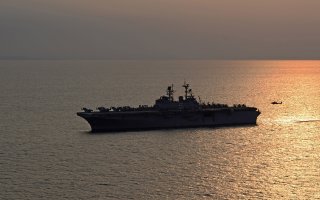Iranian Warships in the Atlantic are No Threat to the United States
Iranian vessels entering the Atlantic Ocean pose only one meaningful test for the Biden administration; can Biden resist the typical U.S. primacist response and not overreact to inconsequential maneuvers?
On Wednesday, Politico reported two Iranian vessels moving south along the east coast of Africa. The ships have now entered the Atlantic Ocean, likely bound for Venezuela. The vessels include a frigate and a converted tanker now serving military purposes, allegedly carrying seven high-speed watercraft.
A Politico correspondent claimed Iranian warships sailing into the Atlantic would significantly test the Biden administration. The event is a test for the Biden administration, just not the test Washington envisions. The test isn’t whether Biden can respond with American might or capitulate, but whether the new administration will react with restraint and respect for the freedom of navigation in international waters.
Sen. Marco Rubio (R-FL) has already suggested that the United States should prevent the ships from reaching Venezuela, where they may be headed. This suggestion is concerning as it fails to consider multiple factors. Iran's presence in international waters is not an inherent threat to U.S. interests, and interference in the freedom of passage on the high seas is out of step with international rules. Intercepting these ships in international waters would have the United States violate the "rules-based world order" it professes to uphold.
The United States often defends its lingering presence in the Middle East by citing Iran’s threat to the freedom of navigation through the Strait of Hormuz. This sort of U.S. primacy approach is the basis for many U.S. foreign policy blunders.
The United States must act according to its interests. This event fails to meet that requirement—and a naval conflict in the Atlantic isn't in U.S. interests.
According to the 2021 Global Firepower Index (GFP), Iran ranks fourteenth in military power while the U.S. ranks first. The United States possesses nearly 100 more naval assets than Iran, and that was before one of Iran’s largest naval vessels, the Kharg, caught fire and sank in the Gulf of Oman on Wednesday. The Kharg was commissioned in 1984, and its sinking illustrates the aging nature of the Iranian fleet.
The Iranian Navy has little ability to be anything more than a nuisance to its U.S. counterparts. Their fleet focuses on coastal protection and area denial, neither of which would be relevant if the United States wasn’t so active in the Persian Gulf. Furthermore, according to the 2019 Defense Intelligence Agency report, more than 90 percent of U.S.-Iranian naval interactions have been deemed safe and professional, despite Iran's vocal objections to the U.S. Middle Eastern presence. Currently, the Iranian Navy is no threat to the United States. However, an incident in the Atlantic Ocean caused by the United States attempting to intercept Iranian naval passage would threaten the safety and professionalism of future U.S.-Iranian interactions in the Persian Gulf.
Venezuela currently ranks lower than Iran, at forty-third, in the GFP with roughly 10 percent of total naval assets as the United States. Even if Iran delivers seven high-speed watercraft to Venezuela, at worst, they are exporting a small portion of their nuisance capabilities to Venezuela. However, if the United States restrains from activity along the Venezuelan coast, these capabilities are null. The seven high-speed crafts do not threaten passage to and from the Panama Canal or the security of Puerto Rico.
Instead of considering naval interdiction in the free passage of Iranian naval vessels, the United States should evaluate its role in the growing Tehran-Caracas connection. Both Iran and Venezuela face sanctions imposed by the United States, which restricts their access to world markets. That market restriction creates an incentive for the two countries to deepen their relationship with each other. Neither country presents an existential threat to the United States, so their deepened connection offers no threat elevation to U.S. security.
This event, at least in part, is a result of bad U.S. policy. Rather than interfere with Iranian naval passage, the U.S. should drop sanctions on both countries so their economies can function. The reduction in bilateral tensions between the United States and both capitals could alter everyone's perspective. Iranian vessels entering the Atlantic Ocean pose only one meaningful test for the Biden administration; can Biden resist the typical U.S. primacist response and not overreact to inconsequential maneuvers?
Scott McCann is a Marcellus Policy Fellow with the John Quincy Adams Society. He holds a B.A. in Political Science from Louisiana State University and an M.A. in International Studies with concentrations in international security, intelligence, and conflict resolution from the Josef Korbel School of International Studies at the University of Denver.
Image: Reuters.

